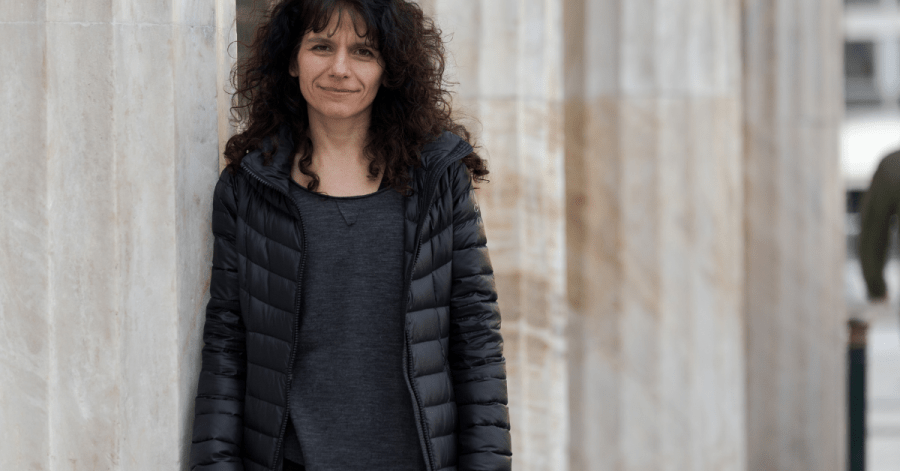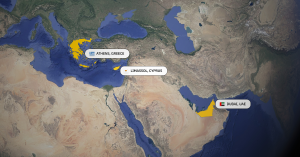Globally, 18% of all students say they want to become entrepreneurs right after finishing their studies, while 32% see themselves as business owners five years after the completion of their studies. However, the jump between intention and real life can be a scary one, especially if you didn’t have a supportive environment in school or university. Thankfully, there are people like Katerina Pramatari, who made it her goal to help the student entrepreneur.
She is one of the founders of the Athens Center for Entrepreneurship and Innovation (ACEin), operated by the Athens University of Economics and Business. The Center’s mission is to bridge the existing gap between valuable insights and outcomes coming from scientific and academic research, on the one hand, and their transformation into commercial solutions, on the other hand.
Besides helping aspiring entrepreneurs find their path, Katerina is also a founding partner at Uni.Fund, a VC fund that aims to leverage the hidden potential in Greek universities, R&D, and Tech space. The car-as-a-service startup FlexCar is part of their portfolio.
In her interview for The Recursive, Katerina shares why failure early in her life was a crucial step in her own journey, how universities can support the student entrepreneur with building the necessary mindset and skills, and what are the factors behind Greece’s recent tech ecosystem success. She worked as a systems analyst and assistant brand manager at Procter & Gamble in Brussels before she decided to pursue a career back in Greece. Along with raising two daughters, Katerina is one of the European experts in IoT.
The Recursive: How did you become passionate about helping the Greek startup community?
Katerina Pramatari, Athens Center for Entrepreneurship: I started my career as a developer abroad but wanted to return back to Greece. I thus moved to the marketing department of a multinational company but didn’t feel passionate about my job. And I had the thinking back then that you need to have a vision and follow it in life, so I resigned. I started my PhD back in 1999, in e-commerce and digital marketing, because of my tech and marketing background. I wanted it to have a real impact. But I couldn’t find real case data. So I had to create a startup.
There was no entrepreneurial ecosystem back then. We were really lucky to have financial support, but because we had no training in that domain, and there was no ecosystem developed, we made all the possible mistakes. We did not use money wisely. The first effort was a total failure. When I was signing the creation of the startup, I was in the hospital giving birth to my second daughter. I was doing everything in parallel – I was raising my kids, doing a PhD, and starting a business.
Two years afterwards, I was given the opportunity to work at the university. I was trying to motivate the student entrepreneur, to convince young students to follow my path because my own experience had shown me that the most important things in life are to create a family, to have an idea on paper, bring it to life, and to create an impact through your idea.
How would you motivate young people to seek opportunities to start a business in Greece?
I was talking to top students in our department and no one was interested in following an entrepreneurial path. The first option for everyone was to get a job in the public sector. When you are 23 years old, the worst thing you can do is to get a position to feel safe. Giving them a position like this, you cut their wings, you don’t help people develop themselves, or the society.
In 2008, we started the e-nnovation competition for e-commerce and that’s how we started the university incubator- ACEin. Apart from some support from the university, and the Municipality of Athens, in 2015 there was no more financing. So, we started conducting open innovation projects with industries to finance it. It was a self-financed incubator inside the university that has supported many students and researchers to find their way. This has now developed into a team of over 10 people with the right mindset to support entrepreneurship.
You have founded and led a university accelerator. What are the top 3 pillars when it comes to bridging the gap between university spin-offs and the business world?
I want to differentiate between two audiences. The first one is the students and the other one – the researchers. Usually, the problem student entrepreneurs have is that they don’t have business experience. They do not know which problem to work on. If you manage to bring this community together with the industry and the industry gives the challenges and the insights, then good results come. Researchers, on the other hand, have technology at hand, they don’t want to do other things other than their research. Few people in the research community have developed business skills.
One main pillar is to help students and researchers develop their entrepreneurial mindset and skills. When you talk to a business person they expect things to be at a very good level of professionalism and maturity. They don’t have time to waste. So, they expect an innovative idea to be ready to roll out in a business environment. The second thing is to help the teams accelerate the idea to become more mature, while they get feedback from the industry. The third pillar is networking and events to bring together the industry with the innovation community. You have to do all three, if you miss one, it doesn’t work.
Is there something like an “instruction set for entrepreneurs” that universities can offer to create a fruitful environment for more entrepreneurs?
I think we first need to understand that these kinds of skills are not developed in a typical way in class. You cannot teach entrepreneurship while the student is sitting at a desk. The only way to develop entrepreneurial skills and mindset is through practice. The earlier you start, the faster you will develop. We talk about skills and mindset that help you identify problems and opportunities in the market. To understand how to make it happen, how much it costs, how to find the center inside yourself to help you move forward, what other resources we need, and financial literacy. All these elements are of key importance for the student entrepreneur.
Having worked with so many young people, do you see any patterns in those who will go out and become entrepreneurs?
Two elements. One is the capability of someone to listen, not just to hear, but to take in what they hear. And the second is not to let things get to them, not to get disappointed with the first obstacle, the first mistake, the first difficulty. You need to always have the power to get over the difficulties. That’s how we innovate. That’s how we move forward.
Greece’s startup ecosystem is growing fast, producing its first unicorns, and we have also seen many successful exits of Greek startups in the last months. What would you say is the driving force behind this?
I think there are three elements that have really worked towards success. One is that, in general, we have highly skilled human capital. The second is, because of the crisis, in the last 10 years nothing was happening here. So everyone was feeling internally big urgency to change things, to take the country into the development path. And lastly, the development of venture capital funds has played a catalytic role. And now you see more and more people getting involved in the ecosystem and creating a positive cycle.
How do you see the Greek startup ecosystem evolving in the next few years?
I can’t easily see a scenario that can stop the development now. We know how to cope with crises. We have now a lot more people that look into that direction, they have the skills but now for the first time, they have also the urgency to go in that direction. We have a much more mature ecosystem, a lot more capital to support what is happening, and a lot more organized structures to support people. The whole ecosystem is on the right path. We just have to continue. In order for Europe to be more entrepreneurial, the whole society should become much more able to accept risk-taking, moving forward. To think more positively that things will go well instead of being very conservative about things.
What is the perfect infrastructure behind universities that can translate their research into business models according to you?
We need to develop a system for implementing innovative concepts with impact. First of all, to help people develop an entrepreneurial mindset and skills early on. Then we have to help them and train them in the process of developing ideas, testing validation, and making the first steps through.
What is your advice to the now-graduating students who would like to start their dream journey but are also scared of the uncertainty?
For innovation, nothing is well defined, everything is rolling. Everything is super unstable, and you just have to get the ball rolling. I think, first of all, for the aspiring student entrepreneur to take action requires working with their fears and thinking positively that things will go well.







